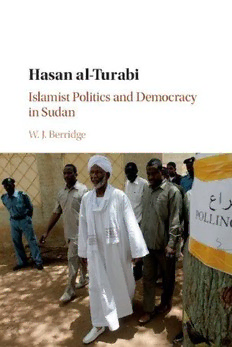
Hasan al-Turabi: Islamist Politics and Democracy in Sudan PDF
Preview Hasan al-Turabi: Islamist Politics and Democracy in Sudan
Hasan al-Turabi Hasan al-Turabi (1932–2016) was seen as one of the most influential figures in modern Sudanese history and politics. This book, based on extensive research and a thorough analysis of al-Turabi’s own writings, provides a comprehensive study of the upbringing, ideas and political career of the Islamist intellectual and political leader. Balancing hostile and favourable accounts of al-Turabi, it challenges assumptions of the ‘Marxist’ or ‘Fascist’ dynamics underpinning Islamism, arguing that its colonialandpostcolonialoriginsdefinethenatureofIslamism’smessage. By encouraging readers to move away from generic models and limited readingsofIslamism,W.J.Berridgeopensnewandvitalresearchforthe understanding of Islamic politics across the Middle East and Africa. It makes for an ideal read for both undergraduate and postgraduate students focusing on the modern Sudanese state and those challenging coredebatesondemocracy,theIslamicStateandjihad. w.j.berridgeisalecturerinhistoryattheUniversityofNewcastle.Her research explores the twentieth-century Islamic world, focusing on government and Islamic politics in Sudan. She is the author of Civil Uprisings in Modern Sudan (2015), which assesses the recent history of civilprotestinSudan. Hasan al-Turabi Islamist Politics and Democracy in Sudan w. j. berridge NewcastleUniversity UniversityPrintingHouse,CambridgeCB28BS,UnitedKingdom OneLibertyPlaza,20thFloor,NewYork,NY10006,USA 477WilliamstownRoad,PortMelbourne,VIC3207,Australia 4843/24,2ndFloor,AnsariRoad,Daryaganj,Delhi–110002,India 79AnsonRoad,#06–04/06,Singapore079906 CambridgeUniversityPressispartoftheUniversityofCambridge. ItfurtherstheUniversity’smissionbydisseminatingknowledgeinthepursuitof education,learningandresearchatthehighestinternationallevelsofexcellence. www.cambridge.org Informationonthistitle:www.cambridge.org/9781107180994 DOI:10.1017/9781316848449 ©W.J.Berridge2017 Thispublicationisincopyright.Subjecttostatutoryexception andtotheprovisionsofrelevantcollectivelicensingagreements, noreproductionofanypartmaytakeplacewithoutthewritten permissionofCambridgeUniversityPress. Firstpublished2017 PrintedintheUnitedKingdombyClays,StIvesplc AcataloguerecordforthispublicationisavailablefromtheBritishLibrary. LibraryofCongressCataloging-in-PublicationData Names:Berridge,W.J.,author. Title:Hasanal-Turabi:Islamistpoliticsanddemocracy inSudan/W.J.Berridge. Description:NewYork,N.Y.:CambridgeUniversityPress,2017.|Includes bibliographicalreferencesandindex. Identifiers:LCCN2017017837|ISBN9781107180994(hardback) Subjects:LCSH:Tura¯bı¯,Ḥasan.|Muslimscholars–Sudan.| Politicians–Sudan.|Islamicfundamentalism–Sudan. Classification:LCCDT157.65.T87B472017|DDC328.624092[B]–dc23 LCrecordavailableathttps://lccn.loc.gov/2017017837 ISBN978-1-107-18099-4Hardback CambridgeUniversityPresshasnoresponsibilityforthepersistenceoraccuracyof URLsforexternalorthird-partyinternetwebsitesreferredtointhispublication anddoesnotguaranteethatanycontentonsuchwebsitesis,orwillremain, accurateorappropriate. Tomyfamily Contents Acknowledgements pageviii ANoteonTransliterationandTerminology ix GlossaryofKeyArabicwords xi ListofAbbreviations xiv Introduction:ConflictingRepresentationsofal-Turabi 1 1 EarlyLifeandEducation,1932–1964 25 2 CharismaandItsLimitations,1964–1989 49 3 SalvationRegime,1989–1999:‘One-ManShow’? 77 4 BetweenLiberalismandTotalitarianism:Al-Turabi’s WesternInfluences 116 5 ReformerorRadical?IslamicandIslamistInfluences 144 6 BetweenGlobalandDefensiveJihad 177 7 TheIslamicState:Sharia,Nationalism andNon-MuslimRights 214 8 Al-Turabi’sIslamistDemocracy:AValidBlueprint? 244 9 ChampionoftheMarginalized?TheDecentralization Strategy 269 10 Legacy:Turabism,Post-Islamism andNeo-Fundamentalism 293 Conclusion 313 Bibliography 324 Index 341 vii Acknowledgements For assistance with the work that produced this book, I would like to thankparticularlythefollowing:KamalAhmadYousif,fortheresearch he undertook on my behalf on Sudan and his many thoughtful suggestions, which contributed a great deal to this project; the British Academy, for funding research trips to the United States and the Netherlands, and within the United Kingdom; Paul Jackson and Northampton’s Radical Research Group, which partly funded the research in Sudan; Professor Justin Willis, for his many helpful suggestions and comments on proposals relating to this project; my family, for their untiring support, and particularly my father, for his constant willingness to read my drafts; Maria Marsh and the team at CambridgeUniversityPress,fortheirsupportduringtheproductionof this monograph; the two anonymous reviewers of this monograph, whose suggestions helped me to expand and clarify its arguments; all the staff at the Library of Congress, Institute of International Social History in Amsterdam, Palace Green Library at Durham and the National Archives in London; Karen Lewis and the Research Bidding Support team at the University of Northampton, for advice on the project; and others such as Hank Cohen, Scott Freeman, Magdi Gizouli, Nicki Kindersley, Cherry Leonardi, Larry Pope, Doug Rae andCathySmith,forhelpinavarietyofways. viii A Note on Transliteration and Terminology Ingeneral,Ihaveattemptedtopursueatransliterationstyleconsistent with that advocated by the International Journal of Middle East Studies, while avoiding usage of long signs and diacritics except an inverted comma to representthe ‘ayn. Nevertheless, I have often ren- deredpropernamesusingthemorecommonspellingswhichfeaturein the literature on Sudan, for example, Abboud rather than Abbud. Ihaveoccasionallyrenderedalifasadoublea(aa)whereitisnecessary toclarifythemeaning,forexample,whenrenderingaform-IIIverbor masdar,suchasmuwaalaandqaaraba. Exceptwhereotherwisenotedinthebibliography,alltranslationsof Arabiclanguageworksinthistextaremyown.Becauseofthedifficulty of translating certain concepts, some of my transliterated words are oftenfollowedbytheArabicoriginalinbrackets,forexample,‘oathof allegiance(ba’ya)’. AllQuranictranslationsinthistextaretakenfromAbdullahYusuf Ali, The Holy Qur’an: Original Arabic Text with English Language Translation & Selected Commentaries (Kuala Lumpur: Saba Islamic Media,2000). Analysts of Sudanese politics often differ over whether to call the Islamist group that al-Turabi led the ‘Islamic Movement’ (al-Haraka al-Islamiyya) or ‘Muslim Brotherhood’ (al-Ikhwan al-Muslimun). While the Sudanese Islamists chose the name ‘Muslim Brotherhood’ in1954,al-Turabiincreasinglybegantodistancehimselffromthisand use‘IslamicMovement’,whichbecamethepredominanttermusedto describe his own Islamist grouping after a group of anti-Turabists entered the National Alliance as the ‘Muslim Brotherhood’ in 1985. Many Islamist scholars will use the terms ‘Muslim Brotherhood’ and ‘IslamicMovement’interchangeablyfortheperiodbefore1985. Scholarsarealsodividedoverthecontextsinwhichtheyshouldrefer to the ‘mother’ movement or the various political parties associated with it, such as the student-led Islamic Liberation Movement, or the ix
